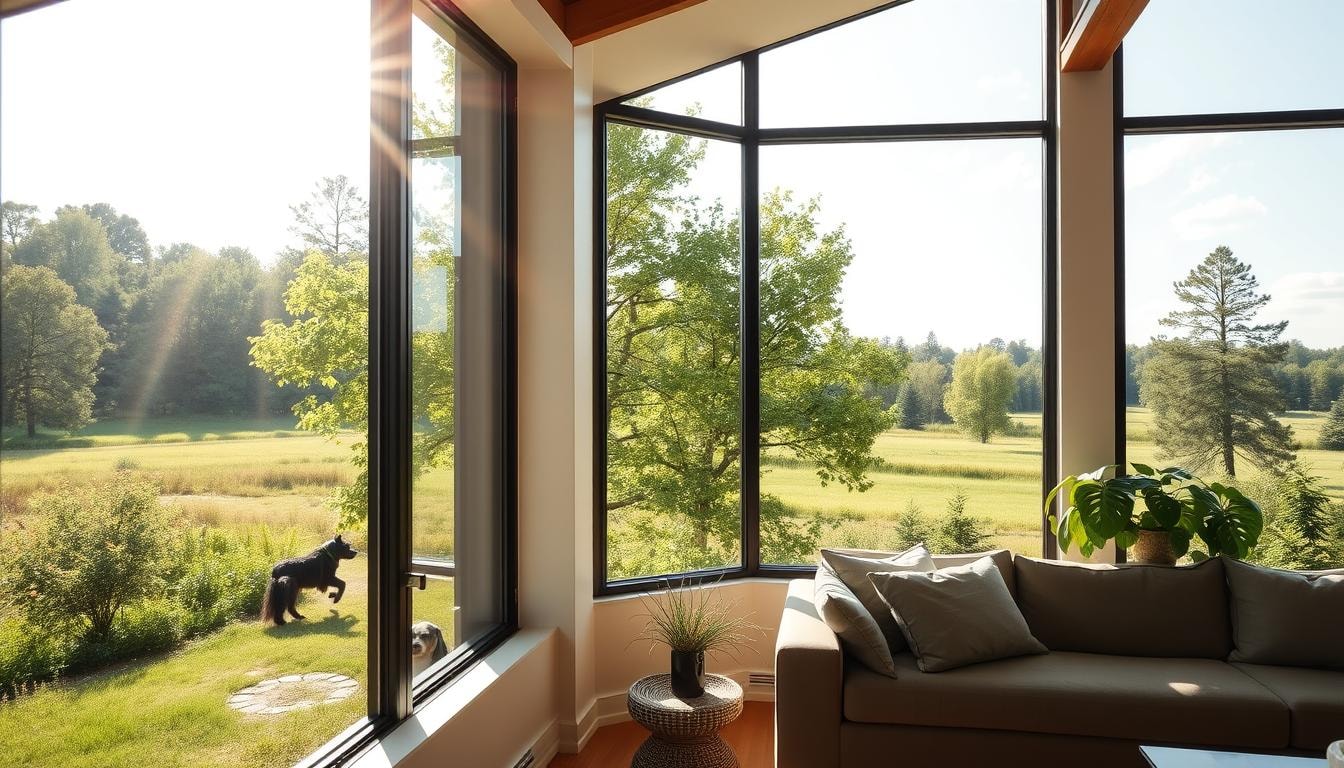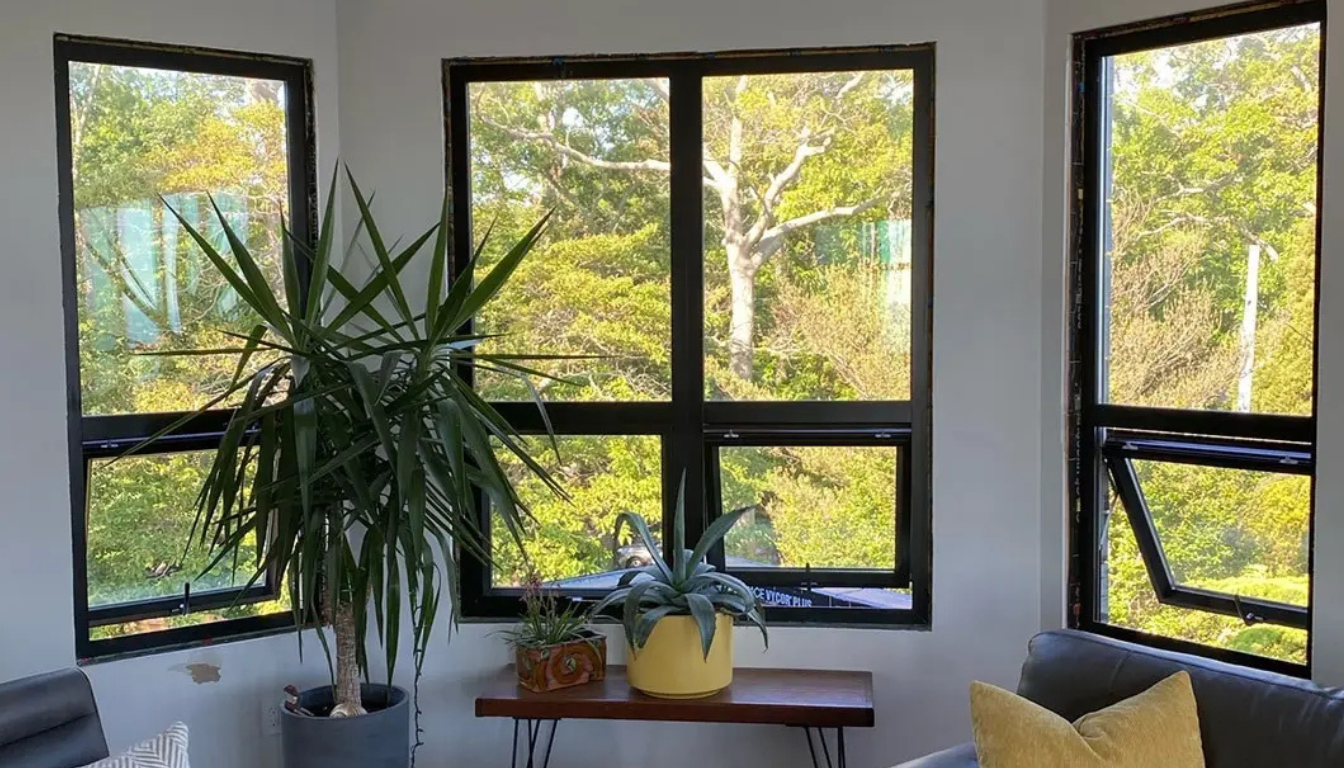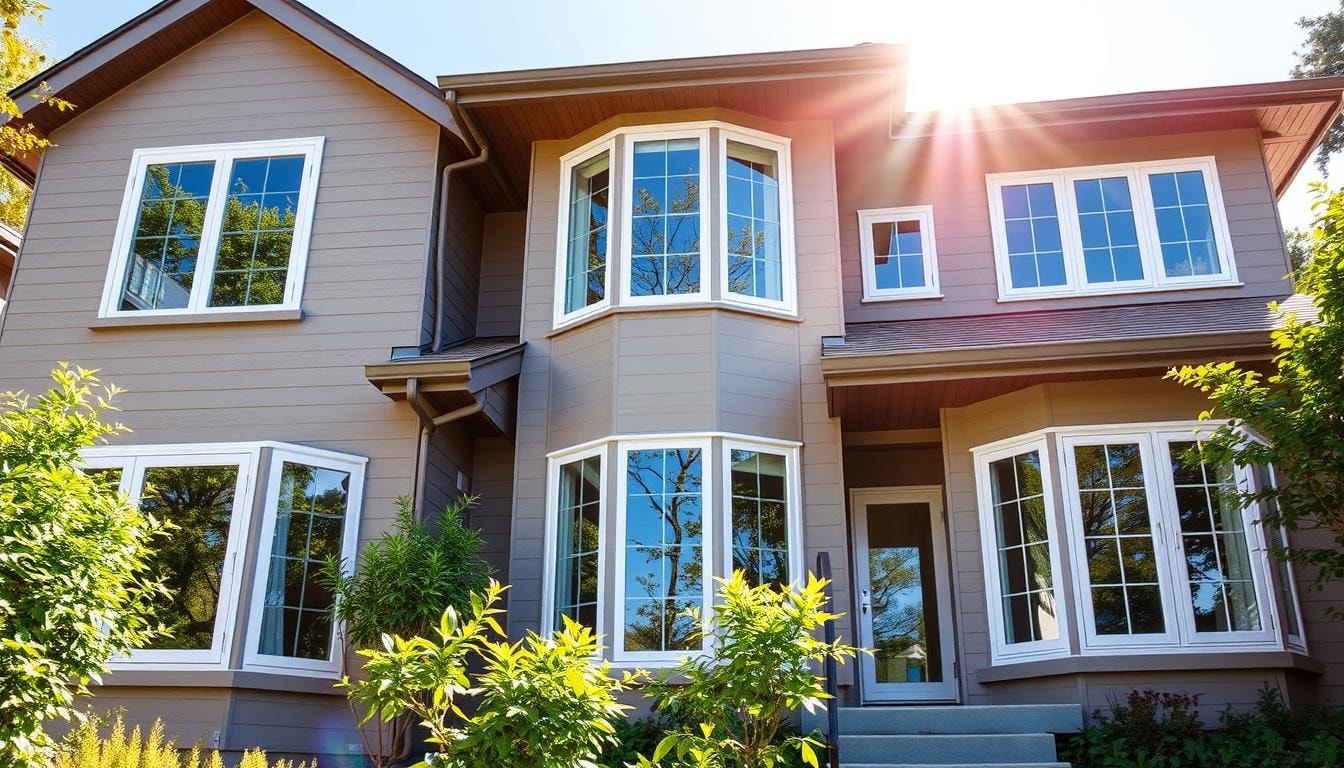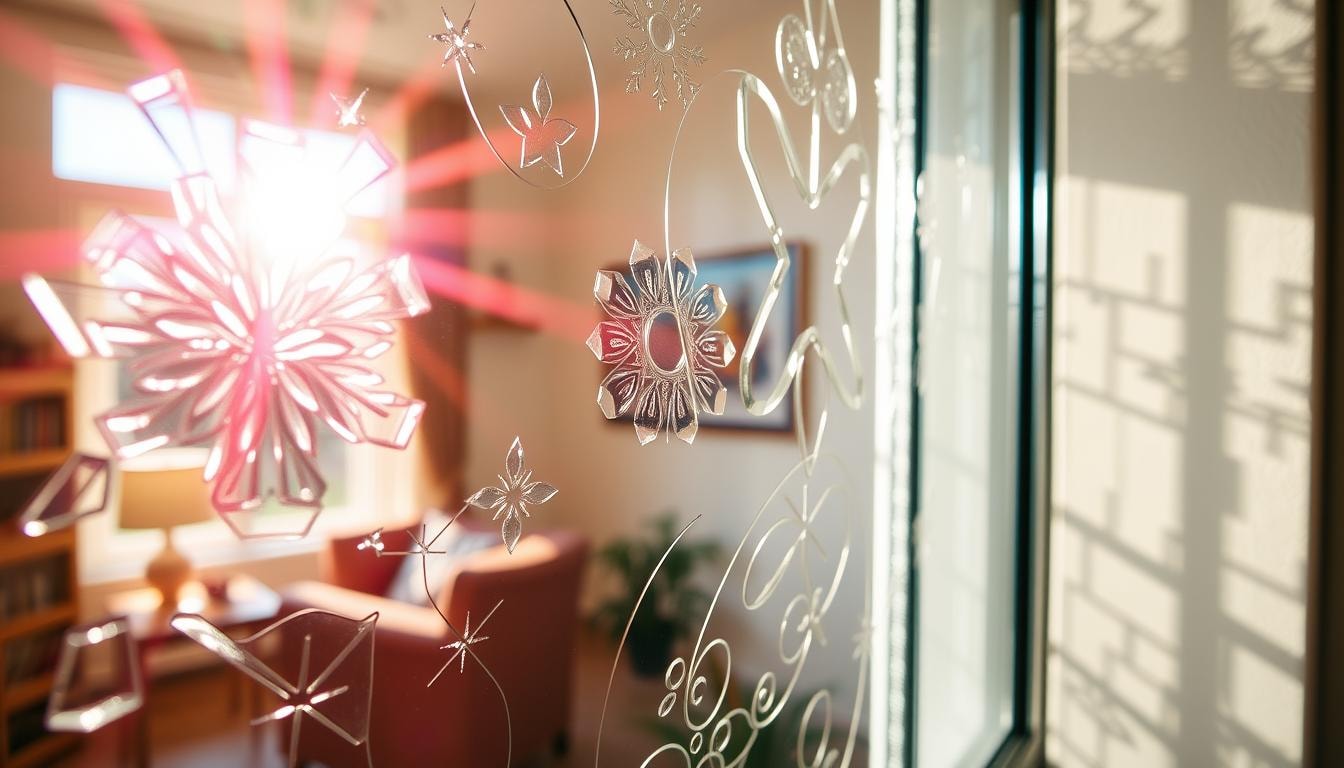
What Is Window Glazing and Why Is It Important
Window glazing is about the glass in windows and how it’s put in. It’s key for a home’s energy use, comfort, and look. Today’s glazing helps control indoor heat, blocks bad UV rays, and cuts down noise. This can save a lot on heating and cooling bills.
The U.S. Department of Energy says about 30% of a home’s heat loss is through windows. Also, up to 76% of sunlight on double-pane windows adds heat in summer. Choosing and installing the right glazing is very important for homes and builders.
Key Takeaways
- Window glazing is crucial for a home’s energy use and comfort.
- Modern glazing systems control heat, block UV rays, and lower noise.
- Windows lose about 30% of a home’s heat, and up to 76% of sunlight can raise cooling costs.
- Choosing and installing the right glazing can save a lot of energy for homeowners.
- Knowing about different glazing types and how they work is key for good choices.
Understanding Window Glazing: Basic Definitions and Concepts
When we talk about windows, “glazing” has two meanings. It can mean the glass panes in a window. Or it can mean the process of putting those glass panes in using a special compound called glazing compound or glazing putty.
The Two Meanings of Window Glazing
Window glazing can be the glass layers in a window frame. These glass panes let light into a building. But, manufacturers call the glass “glass,” not “glazing,” to avoid confusion.
Glazing as a Process vs. Glazing as a Component
The term “glazing” can also mean the way to put glass in a window frame. A special putty is used around the glass edges. This putty holds the glass in place and keeps the window weatherproof. Knowing the difference between these meanings is key when talking about window glazing.
The Evolution of Window Glazing Technology
Window glazing technology has changed a lot over time. It started with single-pane windows but now we have better options like double and triple glazing.
Single-pane windows are not used much anymore because they don’t save energy well. Double-pane windows, or Thermopane, changed the game. They have two glass panes with a special gas in between. This makes them better at keeping heat in and out.
Then, triple-pane windows came along. They are even better at keeping warm in and out. They also block more noise. New coatings and systems have made windows even better at saving energy.
The float glass process, started in the 1950s, made making glass easier and cheaper. This helped make energy-saving glass more common. Glaziers help make cities look good and buildings last longer.
From ancient Roman glass to today’s advanced windows, the journey is amazing. Now, people want windows that save energy and are good for the planet. Glazing is key in making buildings better for everyone.
Different Types of Window Glazing Systems
Homeowners have many choices for window glazing. Each option has its own benefits. The right choice can make a home more energy efficient, quieter, and more comfortable.
Single-Glazed Windows
Single-glazed windows have just one pane of glass. They don’t keep temperature changes out well. They are cheap but not good at keeping heat in, which means higher energy bills.
Double-Glazed Windows
Double-glazed windows have two panes with a gas layer in between. This makes them better at keeping heat in. They are a good mix of cost and performance.
Triple-Glazed Windows
Triple-glazed windows are the best for keeping energy in and noise out. They have three panes with gas in between. This makes them great for very cold places.
Choosing between single, double, or triple-glazed windows depends on what you need. Think about insulated glass units, argon gas, krypton gas, and thermal performance. These will help you pick the best windows for your home.
What Is Window Glazing and Why Is It Important
Window glazing is key for any home. It helps keep your home comfy and saves energy. The right glazing can change your living space a lot. It affects how warm or cool your home is, how quiet it is, and how much UV light gets in.
Glazing makes your home more energy-efficient. It can cut down energy loss by 30% to 50%. This means you spend less on heating and cooling. It keeps your home at a steady temperature all year.
It also makes your home more comfortable. It stops too much heat from coming in during summer and going out in winter. Some glazings even block out more noise, making your home quieter.
Finally, glazing protects your home from UV rays. This keeps your furniture, art, and other things from fading or getting damaged by sunlight.
In short, good window glazing is a smart choice. It saves energy, makes your home more comfy, reduces noise, and protects from UV rays. All these make your home a better place to live.
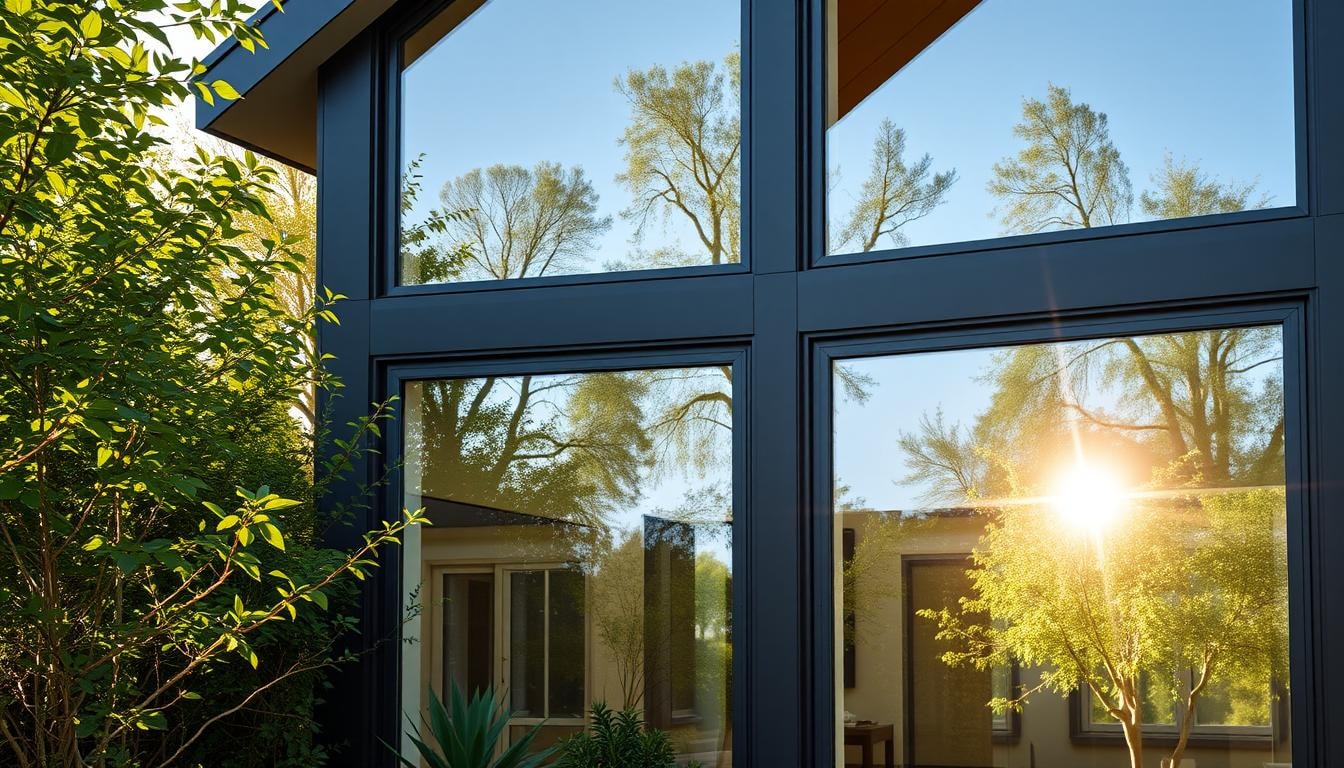
The Role of Glazing in Energy Efficiency
Window glazing is key to a building’s energy use. The U-value shows how well a window keeps heat in. A lower U-value means less heat loss and better energy use.
The Solar Heat Gain Coefficient (SHGC) shows how much sun a window lets in. A lower SHGC means less heat from the sun.
Thermal Performance and U-Values
Double-glazed windows keep more heat in than single-glazed ones. This means lower energy costs and less carbon emissions. Triple-glazed windows are even better for very cold areas.
Switching to double or triple-glazed windows can save £170 a year. It also cuts carbon dioxide emissions by 410kg.
Solar Heat Gain Coefficient (SHGC)
In hot places, the SHGC is very important. Windows with a low SHGC let in less sun heat. This cuts down on air conditioning needs and saves energy.
This is especially true in hot areas. It helps keep energy costs down and makes homes more comfortable.
Knowing about U-values, SHGC, and energy use helps choose the right windows. Energy-efficient windows save money and help the planet over time.
Window Glazing Compounds and Their Applications
Window glazing, or putty, is key in keeping glass panes in place. It makes a seal that keeps air and moisture out. This is important for a window’s performance and life span.
Traditional glazing putty is made from linseed oil and whiting. Modern types might use silicone or acrylic for better durability and flexibility.
Using glazing compounds right is vital for windows to work well. When done correctly, the putty:
- Blocks drafts and air leaks
- Protects against water damage
- Makes a tight seal between glass and frame
- Improves the window’s look
The putty acts as a sealant, keeping the window safe from the weather. This is key to keeping the window frame strong and avoiding damage like rot and mold.
Homeowners and contractors need to choose and apply glazing compounds carefully. This ensures windows work well and save energy for a long time.
Impact of Window Glazing on Home Comfort
Good window glazing makes homes more comfortable. It keeps the temperature right by stopping heat loss in winter and heat gain in summer. This is thanks to glass panes with gas-filled spaces that keep the temperature steady all year.
Temperature Regulation
Window glazing stops heat from moving in and out. This keeps your home cool in summer and warm in winter. It also saves energy by making your heating and cooling work less.
Noise Reduction Benefits
Window glazing also makes homes quieter. Double- and triple-glazed windows block sound better than regular ones. This is great for homes near loud places.
UV Protection Features
Modern window glazing blocks UV rays. This protects your home’s things from fading. It also makes your home feel more comfortable by letting in less sunlight.
Using advanced glazing like low-E coatings and argon gas stops condensation. This prevents mold and damage to windows. High-quality glazing makes your home more comfortable, saves energy, and keeps it safe.
Modern Glazing Technologies and Innovations
Window glazing has seen big changes lately. New technologies are making windows better in many ways. These include low-E coatings, heat mirror tech, and smart glass.
Low-E coatings are thin, invisible layers that stop heat from passing through glass. They reflect infrared light, making windows more energy-efficient. This is good for both homes and businesses.
Heat mirror tech uses a special film between glass panes. It works as well as triple-pane windows but is lighter. This means better energy savings without extra weight.
Smart glass changes how much light it lets in based on electric current or sunlight. It helps save energy and makes buildings more comfortable. It can adjust to the day’s light and temperature.
Vacuum glazing puts a vacuum between glass panes, cutting down heat transfer. It’s as good as triple-pane windows but thinner. It’s great for updating old buildings without big changes.
These new glazing techs make buildings more energy-efficient and comfortable. They use advanced materials and controls. This is changing how we build and live in buildings.
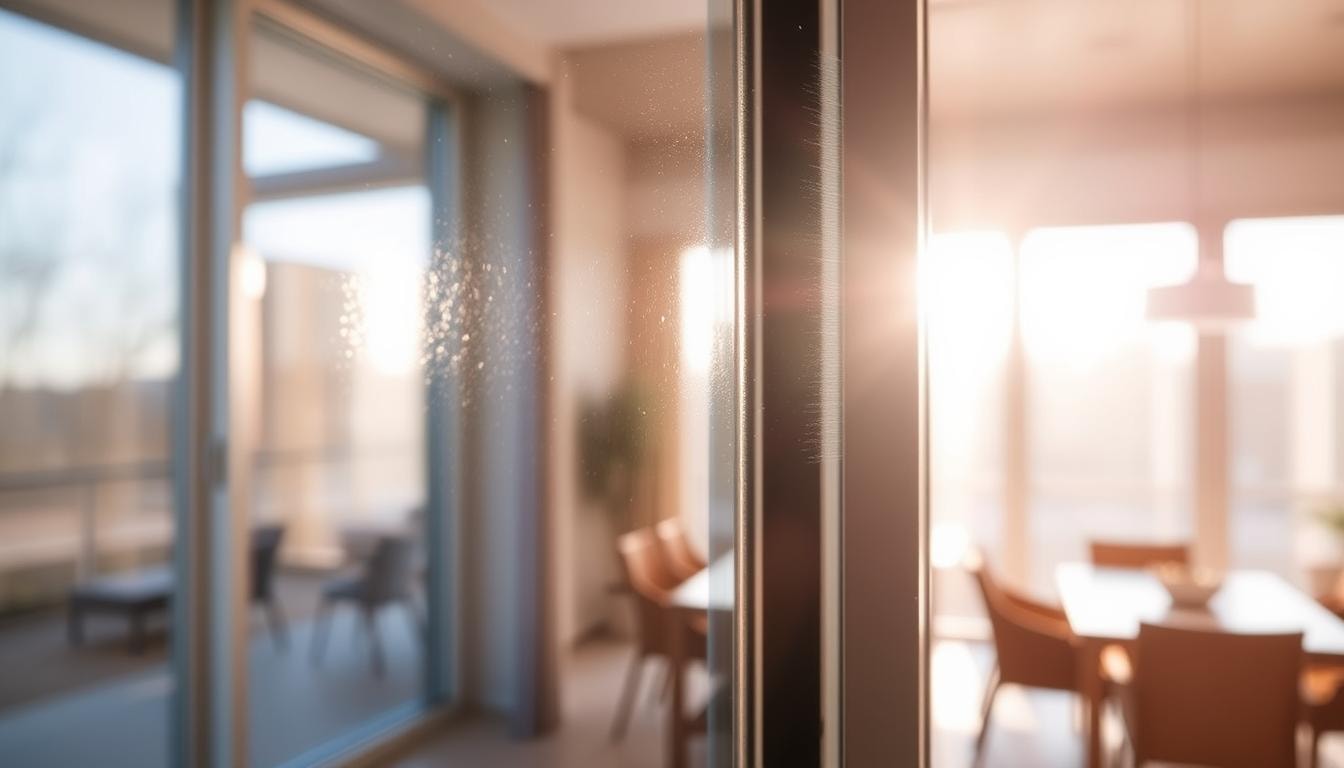
Choosing the Right Glazing for Your Climate
Choosing the right glazing for your windows is key for energy savings. The climate in your area affects the type of glazing you need. By picking the right one, you can keep your home cozy and save energy over time.
Cold Climate Considerations
In cold areas, keeping warm inside is crucial. Look for windows with a low U-factor to block heat loss. Double or triple-glazed windows with argon or krypton gas are great for insulation.
Also, pick windows with Low-E coatings. These coatings reflect heat, making your windows more efficient.
Hot Climate Solutions
In hot places, it’s important to keep the sun’s heat out. Choose windows with a low Solar Heat Gain Coefficient (SHGC). This lets less heat in.
Tinted or reflective glass coatings also help block sun rays. They let in enough light but keep the heat out.
No matter your climate, look for NFRC and Energy Star certified windows. These ratings show how well windows perform. They help you pick the best ones for your home.
Maintenance and Care of Glazed Windows
Keeping your glazed windows in good shape is key. Clean them often with gentle cleaners. This stops dirt and grime from making them look dull.
Check the seals and weatherstripping around your windows every year. If they’re damaged, replace them right away. This keeps your windows sealed tight and stops air leaks. Also, fix condensation prevention problems fast to avoid mold and damage.
Even with care, windows might need reglazing after 20 to 30 years. Look for broken glass, condensation, or drafts. These signs mean it’s time for a new glazing unit.
Some window cleaning and seal inspection tasks you can do yourself. But for big jobs or reglazing, get a pro. They have the right tools and know-how to keep your windows working well.
Regular maintenance and quick fixes can make your windows last longer. This keeps your home cozy and energy-saving for many years.
Cost Analysis and Return on Investment
Window replacements can cost a lot at first. But, energy-saving windows can save you money in the long run. Energy Star-certified windows, for example, might cost more. Yet, they can cut down your bills and pay for themselves in a few years.
Some companies and government programs offer rebates for energy-efficient windows. These rebates can lower the cost of replacing your windows. This makes it a better deal.
When thinking about new windows, consider the costs and savings. Also, think about how they might increase your home’s value. Even though high-end windows cost more, they offer benefits like better temperature control and noise reduction.
The payoff from replacing windows depends on several things. These include your local weather, your current windows’ energy use, and your plans for the future. By looking at the costs and savings, you can choose wisely for your home and budget.
Key Considerations for Window Replacement Costs
- Energy-efficient windows with features like double glazing, low-E coatings, and gas fills can offer significant energy savings over time.
- Customized replacement windows, such as custom sizes, shapes, or color finishes, may cost more than standard options.
- Soundproof windows can provide noise reduction benefits but come at a higher price due to advanced materials and technologies.
- High-performance, energy-efficient windows can increase the resale value of a home.
- Labor costs for window installation may vary based on location, with higher costs in urban areas compared to rural areas.
- Compliance with local building codes and regulations can impact the overall cost of window replacement, especially in historic districts or areas with strict environmental regulations.
Understanding what affects window replacement costs helps homeowners make better choices. The right windows can save energy, increase your home’s value, and make it more comfortable. These benefits can make the initial cost worth it.
Improve Your Home’s Comfort and Efficiency Today
Ready to upgrade your home’s energy efficiency and comfort? At Budget Windows, we offer expert solutions with the right window glazing options for your needs. Whether you’re replacing old windows or selecting new ones, our experts can guide you through laminated glass, double or triple glazing, and other advanced technologies for superior insulation and savings. Contact Budget Windows today for a free consultation and let us make a significant difference in your home’s energy costs and comfort.
Conclusion
Window glazing is key in building and fixing homes. It affects energy use, comfort, and quality of life. The right glazing can save a lot of energy, keep temperatures right, block noise, and protect from UV rays.
Even though high-performance glazing costs more upfront, it pays off in the long run. It saves energy and boosts your home’s value.
Choosing, installing, and caring for window glazing is vital. It ensures energy savings, comfort, and long-term savings. As we look for green and affordable ways to live, advanced glazing will keep getting better.
Knowing about window glazing helps homeowners make smart choices. This leads to homes that are cozy, save energy, and are safe. It’s a step towards a greener future.
FAQs
Why is window glazing important for a home?
Window glazing is important because it improves a home’s energy efficiency, controls temperature, reduces noise, and blocks harmful UV rays.
What is the difference between single, double, and triple glazing?
Single glazing has a single layer of glass, while double glazing has two sheets with an inert gas for insulation. Triple glazing has three sheets for superior insulation and noise reduction.
How does low E glass improve a home’s windows?
Low E glass has metal oxides that reflect the sun’s energy, reducing solar gains and improving visible transmittance for better energy efficiency.
What are the benefits of laminated and tempered glass?
Laminated glass adds an additional layer for safety and soundproofing, while tempered glass is stronger and safer when broken.
How can selecting the right window glazing reduce energy costs?
The right window glazing, like double or triple glazing with low emissivity coatings, reduces air leakage and solar gains, saving energy and lowering heating and cooling bills.





